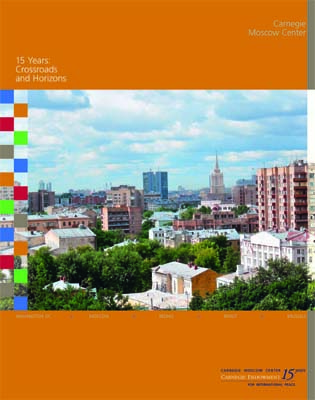Source: Carnegie Moscow Center Brochure
 The Carnegie Endowment for International Peace decided to open the Carnegie Moscow Center in 1992. In 1993, Russia’s first president, Boris Yeltsin, signed a decree allowing the foundation of the Center, and the Carnegie Moscow Center began work in 1994.
The Carnegie Endowment for International Peace decided to open the Carnegie Moscow Center in 1992. In 1993, Russia’s first president, Boris Yeltsin, signed a decree allowing the foundation of the Center, and the Carnegie Moscow Center began work in 1994.
The aim of the Endowment, founded by Andrew Carnegie in 1910, is to “…advance the cause of peace between nations; hasten the time when people will renounce war as an instrument of national policy; encourage and promote peaceful settlement of international disputes and the spread of international understanding and concord; help the development of international law and the adoption by all countries of its founding principles.” The Carnegie Moscow Center seeks to achieve this aim by studying the most important issues for Russia and its relations with the international community, creating forums for free debate on domestic and foreign policy and facilitating the Russian-American dialogue.
We see our 15th anniversary not just as a cause for retrospective analysis, but also as an important moment for forecasting future developments in Europe. Our anniversary coincides with a number of other important dates, from the 20th anniversary of the organization of the first partially free elections in the USSR to the 20th anniversary of the revolutions in Eastern Europe and the fall of the Berlin Wall. As part of our celebration, we are holding a series of Diplomatic Evenings at the Center, at which ambassadors from different countries speak on the future of international relations.
In 2010, the Carnegie Endowment for International Peace will mark its centennial. At the start of the 20th century, Andrew Carnegie believed that the world could be made a better place through the spread of knowledge and international cooperation. At the Carnegie Moscow Center we try to put these ideas into practice.
